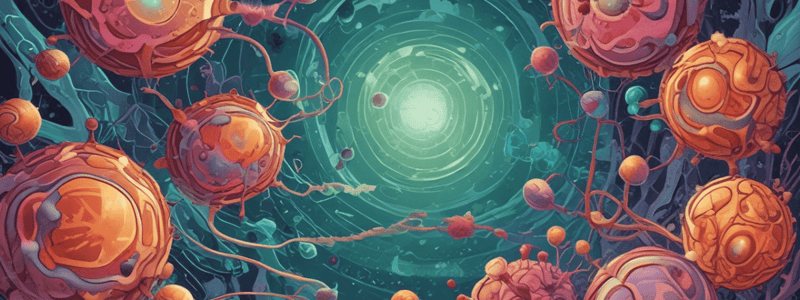Podcast
Questions and Answers
What is the primary function of the immune system's physical barriers?
What is the primary function of the immune system's physical barriers?
- To produce antibodies
- To prevent pathogens from entering the body (correct)
- To induce inflammatory responses
- To distinguish between self and non-self cells
What happens if immune cells are unable to differentiate between self and non-self cells?
What happens if immune cells are unable to differentiate between self and non-self cells?
- The immune system produces more antibodies
- The immune system becomes more tolerant to self-antigens
- Destructive diseases such as lupus erythematosus and rheumatoid arthritis may occur (correct)
- Inflammatory responses are suppressed
What is the role of plasma cells in the immune system?
What is the role of plasma cells in the immune system?
- To kill bacteria and fungi
- To distinguish between self and non-self cells
- To produce antibodies that attack foreign antigens (correct)
- To induce inflammatory responses
What is the function of eosinophils in the immune system?
What is the function of eosinophils in the immune system?
What is the purpose of immune tolerance?
What is the purpose of immune tolerance?
What is the function of the thymus in the immune system?
What is the function of the thymus in the immune system?
What is an example of a hapten?
What is an example of a hapten?
Who is known as the 'Father of Immunology'?
Who is known as the 'Father of Immunology'?
What is the function of white blood cells in the immune system?
What is the function of white blood cells in the immune system?
What is the purpose of a vaccine?
What is the purpose of a vaccine?
What is the primary function of the spleen in the immune system?
What is the primary function of the spleen in the immune system?
What type of immunity is present from birth and serves as the first defense against pathogens and diseases?
What type of immunity is present from birth and serves as the first defense against pathogens and diseases?
What is the main difference between innate and adaptive immunity?
What is the main difference between innate and adaptive immunity?
Which of the following is an example of innate immunity?
Which of the following is an example of innate immunity?
What is the term for the ability of immune cells to distinguish between self and non-self cells?
What is the term for the ability of immune cells to distinguish between self and non-self cells?
Flashcards are hidden until you start studying
Study Notes
The Immune System
- The immune system is a complex network of organs, cells, and tissues that protect the body from infections and diseases.
- It enhances the body's ability to fight infections, which can be bacterial, viral, parasitic, haptens, or fungal.
- Haptens are small molecules that stimulate antibody production and cause an immune response, often combined with larger molecules like proteins.
History of Immunology
- In 1789, a viral infection called smallpox spread, killing around 10% of the population.
- Edward Jenner discovered a vaccine against smallpox, earning him the title "Father of Immunology" and pioneer of vaccination.
- The vaccine is a material derived from the causal agent of a disease, intended to promote antibody production and offer protection against diseases and pathogens.
Immune System Organs
- The immune system consists of various organs, tissues, and cells, including:
- Thymus: produces T cells that circulate the body and invade foreign antigens.
- Bone marrow: synthesizes red and white blood cells, and platelets, with white blood cells playing a key role in immunity.
- Lymph nodes: filter lymph from foreign bodies and produce lymphocytes to attack them.
- Tonsils: prevent foreign bodies from entering the lungs.
- Skin: acts as the first barrier and defender of the body, with immune cells like Langerhans cells.
- Spleen: filters the blood from pathogens and gets rid of old and damaged red blood cells.
Immune System Divisions
- The immune system is divided into two parts: innate immunity and adaptive (specific) immunity.
- Innate immunity is the first line of defense, providing immediate and non-specific protection against pathogens.
- Adaptive immunity is activated after exposure to an antigen, providing specific protection against diseases and pathogens.
Innate Immune System
- Innate immunity includes chemical barriers like tears and stomach acids, and physical barriers like the skin.
- It also involves cytokines, which manage the immune cell's reactions.
- Innate immunity is immediate and fast but non-specific, meaning it doesn't target a particular pathogen or infection.
Adaptive Immune System
- Adaptive immunity is activated after exposure to an antigen, either through vaccination or pathogenic disease.
- It involves humoral and cell-mediated immune responses, mediated by antibodies and B cells, and T cell activation, respectively.
- The adaptive immune system is slower than innate immunity but develops immunological memory against diseases and pathogens.
How the Immune System Works
- When an innate immune response fails, adaptive immunity is triggered, specifically targeting the new infection.
- Adaptive immunity develops memory to act on it upon re-exposure, providing long-term protection.
Immune Tolerance
- The immune system's ability to distinguish between self and non-self cells is called immune tolerance.
- Innate and adaptive immunity can differentiate between self and non-self cells, preventing the immune system from attacking healthy cells.
Immune System Functions
- The immune system prevents infection through physical and chemical barriers.
- It directly destroys infected cells through various immune cells like T-cells, neutrophils, eosinophils, lymphocytes, and more.
- Different immune cells have unique roles and functions, such as antibody production, inflammatory responses, and getting rid of damaged cells.
Studying That Suits You
Use AI to generate personalized quizzes and flashcards to suit your learning preferences.




